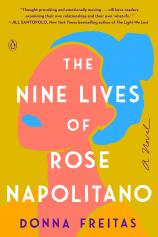The Nine Lives of Rose Napolitano
Review
The Nine Lives of Rose Napolitano
In a single lifetime, each decision we make is both final and fraught with the possibility of many outcomes. Fiction is often about the “what ifs” of decisions and their consequences.
In THE NINE LIVES OF ROSE NAPOLITANO, author Donna Freitas takes this idea of potential storylines to an inventive place as she presents nine distinct lives for her titular character based on the single decision of whether or not to have a baby. Readers follow Rose Napolitano through a series of chapters that depend on this singular and complex decision. Always starting with an argument with her husband Luke over whether or not she is taking prenatal vitamins, the novel moves Rose across more than two decades of the argument’s various aftereffects.
"Rose is an attractive character who is smart, honest and thoughtful. Freitas does a good job capturing the pressure women continue to feel to meet gendered expectations, even if her character ultimately bows to them."
Rose never wanted to be a mother. In fact, in some of the “lives” she lives, this breaks her own mother’s heart. But the greater conflict over having children is with Luke. Even though Rose is clear from the start about her lack of interest in parenting, and even though Luke seems to share the sentiment, over time he changes his mind and very much wants a child. Some versions of Rose are unwavering in her insistence that she will not bear a child, while in others she considers and rejects the idea. Still, in other scenarios, she becomes pregnant and falls in love with her daughter Addie, who readers watch grow up in the ensuing chapters.
In yet another life, Rose becomes a stepmother to her new husband Thomas’ daughter, Addie. Her responses and decisions impact the lives of those around her. Divorcing Luke means that he is free to remarry, and depending on how she reacts to Thomas, he is her lover, her colleague or her husband. Rose’s mother, an important influence on her mindset, has emotional shifts in the novel, while her father and her friend Jill remain constant.
The structure of the book is non-linear, which can feel muddled at times. Freitas chops up each narrative and skips back and forth in time. It is not always clear if readers are meant to see these lives as parallel realities, mere possibilities or thought experiments. The structure is elusive and open-ended, which can distract from the compelling and important themes.
The novel is about motherhood, but Freitas puts a lot under that umbrella: marriage, divorce, romance, partnership, autonomy and daughterhood. Whether or not Rose is a mother in any of these iterations, she is always a wife, daughter, professional and friend. Her relationships with the other characters offer her guidance, support and advice. Yet even in her storylines with Addie, Rose remains the clear center of the novel, and her interior life is the driving mechanism. Motherhood is the knot in the thread that Freitas is picking apart. Rose’s doubts about motherhood and her conviction not to become a parent still usually lead her to motherhood anyway, whether it is as a reluctant birth mom or a stepparent. This, not to mention an unfortunately described abortion provider's office, undermines some of the interesting questions that Freitas asks about gender roles, parenthood, autonomy and more.
Rose is an attractive character who is smart, honest and thoughtful. Freitas does a good job capturing the pressure women continue to feel to meet gendered expectations, even if her character ultimately bows to them. THE NINE LIVES OF ROSE NAPOLITANO is a provocative story that gets bogged down in some structural ambiguity and its unwillingness to allow Rose to reject the path that other characters want to put her on.
Reviewed by Sarah Rachel Egelman on April 23, 2021
The Nine Lives of Rose Napolitano
- Publication Date: April 5, 2022
- Genres: Fiction, Women's Fiction
- Paperback: 384 pages
- Publisher: Penguin Books
- ISBN-10: 1984880616
- ISBN-13: 9781984880611




